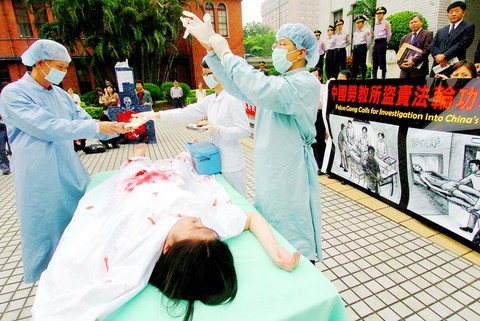The legislature yesterday passed a provisional resolution calling on international human-rights organizations to investigate what it said was China's "monstrous crime" of harvesting the organs of Falun Gong practitioners.
"We urged that the United Nations and other international human-rights organizations send their observers to China to inspect the situation and demand that the Chinese authorities tell the truch about this matter," the resolution states.
The draft resolution, backed by about 50 lawmakers from across party lines, came in the wake of an appeal by a group of Taiwanese Falun Gong practitioners.

PHOTO: LO PEI-DER, TAIPEI TIMES
The group performed a play showing how organs were harvested from living bodies at a press conference in front of the Legislative Yuan yesterday.
"There has been speculation that more than 10,000 Falun Gong practitioners kept in China's concentration camps might have been killed so that their organs could be harvested," said Chang Ching-hsi (
Chang made the remarks based on a report released by Voice of Hope Broadcast, a media outlet linked to the Falun Gong, in which doctors in China's transplant centers in Hubei, Shanghai, Beijing, Shaanxi and Liaoning said there would be many organs available for transplant by the end of this month.
"I bet you that the organs will be very fresh and most of them will be from young people aged 20-30 years old. If you want [an organ transplant], you had better come before May 1," one doctor said in the report.
In response to a reporter's question, the doctor confirmed that the livers or kidneys were coming from labor camps where many Falun Gong practitioners are kept.
"Yeah, but what we care about is the quality, not the source," the doctor said.
Chang showed the taped interview with the doctor at the press conference.
He accused the Chinese authorities covering up evidence that Falun Gong practitioners are being killed to develop the organ transplant industry.
The Falun Gong-lined Epoch Times Web site reported on March 9 that organs were being harvested from Falun Gong practitioners in Sujiatun District, Shenyang City.
"We know that there are about 36 other labor camps in China similar to the one in the Sujiatun. We called on the international community to force the Chinese authorities to say how many camps they have, how many people have been executed and how many organs have been harvested," the provisional resolution states.
Democratic Progressive Party (DPP) Legislator William Lai (賴清德), who initiated the provisional resolution, said every government should boycott harvested organs from China by barring their citizens from having transplant surgery in China.
He said an official resolution will soon be approved by the legislature in order to make it more effective.

Alain Robert, known as the "French Spider-Man," praised Alex Honnold as exceptionally well-prepared after the US climber completed a free solo ascent of Taipei 101 yesterday. Robert said Honnold's ascent of the 508m-tall skyscraper in just more than one-and-a-half hours without using safety ropes or equipment was a remarkable achievement. "This is my life," he said in an interview conducted in French, adding that he liked the feeling of being "on the edge of danger." The 63-year-old Frenchman climbed Taipei 101 using ropes in December 2004, taking about four hours to reach the top. On a one-to-10 scale of difficulty, Robert said Taipei 101

A preclearance service to facilitate entry for people traveling to select airports in Japan would be available from Thursday next week to Feb. 25 at Taiwan Taoyuan International Airport, Taoyuan International Airport Corp (TIAC) said on Tuesday. The service was first made available to Taiwanese travelers throughout the winter vacation of 2024 and during the Lunar New Year holiday. In addition to flights to the Japanese cities of Hakodate, Asahikawa, Akita, Sendai, Niigata, Okayama, Takamatsu, Kumamoto and Kagoshima, the service would be available to travelers to Kobe and Oita. The service can be accessed by passengers of 15 flight routes operated by

Taiwanese and US defense groups are collaborating to introduce deployable, semi-autonomous manufacturing systems for drones and components in a boost to the nation’s supply chain resilience. Taiwan’s G-Tech Optroelectronics Corp subsidiary GTOC and the US’ Aerkomm Inc on Friday announced an agreement with fellow US-based Firestorm Lab to adopt the latter’s xCell, a technology featuring 3D printers fitted in 6.1m container units. The systems enable aerial platforms and parts to be produced in high volumes from dispersed nodes capable of rapid redeployment, to minimize the risk of enemy strikes and to meet field requirements, they said. Firestorm chief technology officer Ian Muceus said

MORE FALL: An investigation into one of Xi’s key cronies, part of a broader ‘anti-corruption’ drive, indicates that he might have a deep distrust in the military, an expert said China’s latest military purge underscores systemic risks in its shift from collective leadership to sole rule under Chinese President Xi Jinping (習近平), and could disrupt its chain of command and military capabilities, a national security official said yesterday. If decisionmaking within the Chinese Communist Party has become “irrational” under one-man rule, the Taiwan Strait and the regional situation must be approached with extreme caution, given unforeseen risks, they added. The anonymous official made the remarks as China’s Central Military Commission Vice Chairman Zhang Youxia (張又俠) and Joint Staff Department Chief of Staff Liu Zhenli (劉振立) were reportedly being investigated for suspected “serious